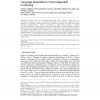Free Online Productivity Tools
i2Speak
i2Symbol
i2OCR
iTex2Img
iWeb2Print
iWeb2Shot
i2Type
iPdf2Split
iPdf2Merge
i2Bopomofo
i2Arabic
i2Style
i2Image
i2PDF
iLatex2Rtf
Sci2ools
131
click to vote
TRETS
2010
2010
Performance Analysis Framework for High-Level Language Applications in Reconfigurable Computing
s, and abstractions, typically enabling faster development times than with traditional Hardware ion Languages (HDLs). However, programming at a higher level of abstraction is typically accompanied by some loss of performance as well as reduced transparency of application behavior, making it difficult to understand and improve application performance. While runtime tools for performance analysis are often featured in development with traditional HLLs for sequential and parallel programming, HLL-based development for FPGAs have an equal or greater need yet lack these tools. This paper presents a novel and portable framework for runtime performance analysis of HLL applications for FPGAs, including an automated tool for performance analysis of designs created with Impulse C, a commercial HLL for FPGAs. As a case study, this tool is used to successfully locate performance bottlenecks in a molecular dynamics kernel in order to gain speedup. Categories and Subject Descriptors: B.8.2 [PERFORMA...
Related Content
| Added | 31 Jan 2011 |
| Updated | 31 Jan 2011 |
| Type | Journal |
| Year | 2010 |
| Where | TRETS |
| Authors | John Curreri, Seth Koehler, Alan D. George, Brian Holland, Rafael Garcia |
Comments (0)

